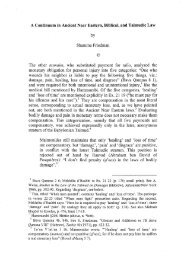Wimpfheimer_ Is it not so.pdf
Wimpfheimer_ Is it not so.pdf
Wimpfheimer_ Is it not so.pdf
Create successful ePaper yourself
Turn your PDF publications into a flip-book with our unique Google optimized e-Paper software.
Toward a Poetics of Legal Narrative in the Talmud ❙ 53<br />
drink of water'' (<strong>so</strong> that <strong>it</strong> const<strong>it</strong>utes a loan together w<strong>it</strong>h the owner's<br />
service).⁶ But if [the lender] is wise, he should answer [the borrower],<br />
``First borrow <strong>it</strong>⁷ (and then I will give you a drink).''⁸<br />
Rava said: A teacher of children,⁹ (a gardener),¹⁰ a butcher, a cupper,¹¹<br />
and a town¹² scribe¹³Ðall [if they lend <strong>so</strong>mething] while at work<br />
const<strong>it</strong>ute a loan in the owner's presence.<br />
The scholars¹⁴ said to Rava:¹⁵ ``You, Master, are in our service.''¹⁶<br />
He was enraged:¹⁷ ``You wish to deprive me of my money!'' [he<br />
exclaimed]. ``On the contrary, you are in my service! For I can change<br />
you over from one tractate to a<strong>not</strong>her, while you can<strong>not</strong>!''<br />
But <strong>it</strong> is <strong>not</strong> <strong>so</strong>. He is in their service during the Kallah days, while<br />
they are in his service on other days.¹⁸<br />
Rava's in<strong>it</strong>ial protagonistÐthe one who wishes to borrow w<strong>it</strong>hout liabil<strong>it</strong>yÐ<br />
seizes an opportun<strong>it</strong>y o²ered by the tanna<strong>it</strong>ic rede®n<strong>it</strong>ion of presence. Aware of the<br />
contractual nature of presence, the borrower attempts to achieve blanket liabil<strong>it</strong>y<br />
protection by cunningly contracting for the services of the bailment's unaware<br />
owner. ``Pour me a glass of water''Ðan everyday statement is here employed as a<br />
subtle, even magical,¹⁹ means of achieving exoneration. By contracting w<strong>it</strong>h the<br />
bailment's owner, the wily borrower attempts to meet the threshold of presence.<br />
Fortunately, the object's owner has al<strong>so</strong> studied rabbinic law and knows that<br />
presence is complicated by prior<strong>it</strong>y. By ®rst lending the object, the lender successfully<br />
rejects the borrower's attempt while maintaining appearances. Sure, I'll<br />
pour you your water, after you borrow my object. The thrust is easily parried, as<br />
control of the legal material allows for law's metamorphosis into comedy.<br />
By opening his treatment of the mishnah w<strong>it</strong>h this light-hearted application,²⁰<br />
Rava highlights the opportun<strong>it</strong>y that legal mastery presents for abuse. Both<br />
borrower and lender are potential masters of talmudic law. Though the scheming<br />
borrower begins the statement, the hero of the statement is the wily lender, whose<br />
familiar<strong>it</strong>y w<strong>it</strong>h the law prevents his ®nancial demise. The schematic of combatants<br />
in the legal arena as well as the playfulness of the in<strong>it</strong>ial attempt to achieve blanket<br />
exoneration will shortly reappear in the narrative. Before arriving there, we<br />
encounter Rava's analysis and development of the rabbinic law.

















